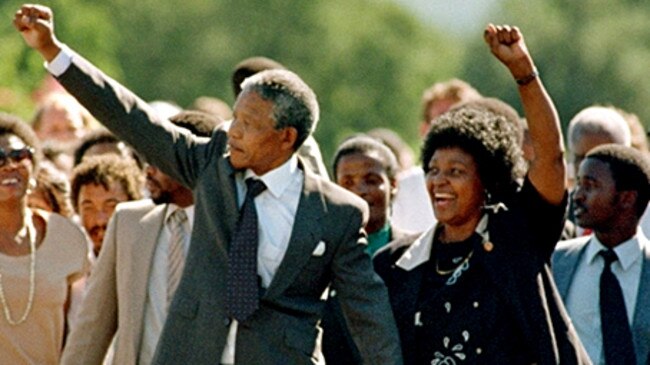World cheered as Mandela walked to freedom
The world was changing drastically 25 years ago, with the crumbling of the Berlin Wall, the dismantling of apartheid and the release of Mandela

Today in History
Don't miss out on the headlines from Today in History. Followed categories will be added to My News.
It was an age of miracles. The Berlin Wall was being torn down, the Communist party had voted to end its monopoly on power in the Soviet Union, and in South Africa president F.W. de Klerk had lifted the ban on the African National Congress. Nelson Mandela, the face of the ANC and of the anti-apartheid movement, was finally allowed to walk free.
Twenty-five years ago today, Mandela ended 27 years as a political prisoner. It heralded a new era for South Africa, one when apartheid would be dismantled and Mandela would stand for president. While it didn’t immediately end all of South Africa’s woes, it was a great sign of hope for his countrymen and for many others around the world living under oppressive regimes.
Mandela was born in 1918, the son of a Tembu chief but renounced his succession claims to pursue a law career. His strong sense of social justice led him to joining the ANC, a “black” liberation organisation, in 1948.
Originally committed to peaceful resistance, after the massacre of unarmed protesters at Sharpeville in 1960 he helped found a military wing of the ANC. In 1962 he left South Africa for guerrilla training in Algeria but was arrested returning home and tried for treason, sabotage, conspiracy to incite rebellion and leaving the country illegally.
At his trial in 1964 he said: “I have cherished the ideal of a democratic and free society in which all persons live together in harmony and with equal opportunities. It is an ideal I hope to live for and to achieve. But if needs be, it is an ideal for which I am prepared to die.”
Sentenced to life in prison, he was sent to Robben Island, where he remained until 1982, when he was transferred to Pollsmoor Prison. In 1985, president Pieter Willem Botha, faced with rising insurrection in South Africa, offered to release Mandela and other political prisoners if they would publicly renounce violence.
The offer was rejected.
In 1988, Mandela was transferred to Victor Verster Prison, where he was given a more comfortable warder’s house, with a pool, to live in. After years of living a Spartan existence in a prison with minimal contact with the outside world, denied permission to attend the funeral of his mother or his son, he suddenly had more freedom and contact with family members.
While locked away, Mandela had continued to be an inspiration for his people while the campaign for his release had become a genuinely global cause.
The cause gathered even more momentum in the 1980s with a series of rallies and concerts. Jerry Dammer, member of the band The Specials, attended one concert and wrote the ska song Free Nelson Mandela, released in 1984. It became a top 10 hit, an anthem for the campaign bringing the cause to an even wider public.
The British Anti-Apartheid Movement staged a famous concert at Wembley Stadium in 1988 with a cast of big-name stars including Dire Straits, Eric Clapton, Simple Minds, Whitney Houston and Tracy Chapman.
Botha’s resignation due to illness in 1989 brought de Klerk to power, with a radical plan for reform including free elections and the ending of apartheid policies.
Summoned to de Klerk’s office in December 1989, Mandela made demands of the president for his release and the ending of the ban on the ANC. De Klerk made no promises but listened patiently. Both men would walk from the meeting thinking “this is a man I can do business with”.
Another two meetings ensued, not always smooth but despite the occasional clash, de Klerk would later say “we always found it possible to raise the issue above the tension so that the process could move forward”.
When de Klerk set the date for Mandela’s release, at first the prisoner tried to delay it by saying: “We need more time for preparation.”
Amid a festive atmosphere, his release finally came on February 11, 1990, with images of Mandela walking free and giving the black power salute beamed live around the world. The silvered-haired man was a stark contrast to the images we had come to know of him as a younger man.
Mandela gave a speech beginning: “Friends, comrades and fellow South Africans. I greet you all in the name of peace, democracy and freedom for all.”
Yet with work still to do, at the end of the speech he recalled things he had said in 1964, reassuring all he was still prepared to die for democracy and freedom.
De Klerk made good his promise to hold free elections in 1994 and Mandela became the country’s first black president.



